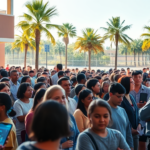Sure, here’s the rewritten article on school district runoffs:
Runoffs in Edinburg and Weslaco School Districts Reflect a Surge in Voter Turnout at PSJA
The school districts of Edinburg and Weslaco are experiencing pivotal runoff elections, driven by increased voter turnout across the Rio Grande Valley (RGV), particularly in the Pharr-San Juan-Alamo (PSJA) district. This significant uptick in civic engagement may reshape local educational policies and has already sparked extensive community interest.
Key Developments in RGV School Elections
The elections have been characterized by intense campaigns and a renewed focus on voter participation. In particular, the PSJA area has seen a noticeable surge in turnout, attributed to robust community efforts to engage Valley residents in the democratic process. These runoffs represent critical moments for local educational governance, potentially steering the districts in new directions.
“The increase in voter turnout reflects a growing recognition of the importance of our local school boards in shaping the future of education in South Texas,” said Maria Hernandez, a community organizer in Edinburg. “Residents are beginning to see the power they hold in influencing key decisions that affect their children’s education.”
Background and Context
The Rio Grande Valley is a region marked by dynamic educational needs and opportunities, with local school districts playing a pivotal role in community development. Over the years, issues such as funding allocation, curriculum changes, and teacher retention have dominated school board agendas, and these runoffs provide a crucial juncture for addressing such concerns.
Increased public awareness and involvement can be traced to various voter education initiatives rolled out across the Valley. These efforts aim to empower citizens by elucidating the critical impact of board decisions on school environments.
Local Impact: Shaping the Educational Landscape
The consequences of these elections stretch beyond immediate policy changes, promising long-term implications for educational standards and resources available to students. In Edinburg and Weslaco, the runoffs are seen as opportunities to instigate reforms aimed at enhancing educational equity and support for both students and educators.
One Weslaco parent, Jose Martinez, emphasized the role of community voices in the election. “We want leaders who understand our struggles and who are committed to providing quality education regardless of socioeconomic status,” Martinez expressed.
Connections to Ongoing Issues
These elections are tightly linked to broader educational themes in the RGV, including addressing infrastructural needs in schools and adapting to an ever-changing educational landscape post-pandemic. The runoffs come at a time when many districts are re-evaluating strategies to cope with these challenges while maintaining academic excellence.
The focus on PSJA voter turnout is particularly noteworthy as it underscores the community’s resolve to actively participate in shaping educational policies. This engagement is a response to past concerns about inadequate representation in decision-making, illustrating a shift towards more inclusive and diverse voices.
What Lies Ahead for the Valley?
The outcomes of these runoffs will undoubtedly influence future decisions on educational funding, program implementation, and community relations. School board members elected during this period will have the mandate to tackle existing disparities and work toward a unified vision for the regional education system.
As anticipation builds, some experts weigh in on the potential ripple effects throughout South Texas. Dr. Elena Cruz, an educational policy analyst, noted, “The RGV is poised for significant change in its educational approach if these elections translate into actionable insights and policies that resonate with community needs.”
Balancing Views on Educational Governance
While excitement abounds, the runoffs also generate dialogue about balancing new policy implementations with existing frameworks. Some stakeholders caution against radical shifts without comprehensive evaluation, advocating for informed, steady progress to give schools and students sufficient time to adapt.
Rosalinda Garcia, an educator from McAllen, highlighted the importance of measured decision-making. “Change is necessary, but it must be done thoughtfully to ensure long-term success and stability for our students and educators. Our goal is to enhance local impact without undermining existing educational foundations.”
Getting Involved: Resources for Residents
For residents eager to follow the progress of these elections, various local organizations and news outlets, including RGV Local News, provide timely updates and discussions. Community forums and school district websites also offer platforms for continued engagement and feedback.
In summary, the runoff elections at the Edinburg and Weslaco school districts, marked by increased PSJA voter turnout, represent crucial moments for the RGV’s educational trajectory. The collective actions of Valley residents demonstrate a heightened awareness of the power vested in local governance, promising potential advancements in educational practices and community building.







